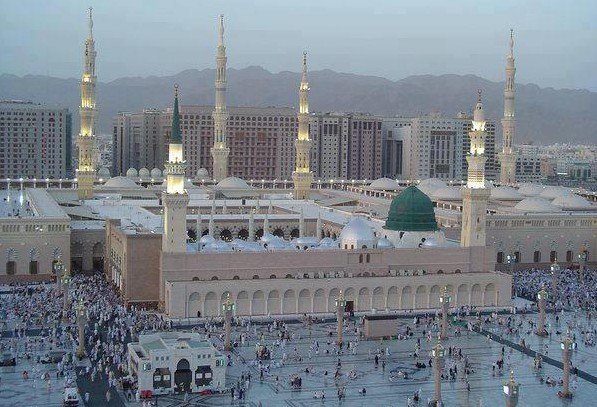নবীনেতাঃ মুহাম্মদ মুস্তফা (সাঃ)/ Life of Muhammad (saw)
মুহাম্মাদ[টীকা ১] (আরবি: مُحَمَّد, ২৯ আগস্ট ৫৭০[৩] – ৮ জুন ৬৩২;[৪] মোহাম্মদ এবং মুহম্মদ নামেও পরিচিত) হলেন ইসলামের কেন্দ্রীয় ব্যক্তিত্ব এবং ইসলামি বিশ্বাস মতে আল্লাহ কর্তৃক প্রেরিত সর্বশেষ নবি (আরবি: النبي; আন-নাবিয়্যু), তথা ‘বার্তাবাহক’ (আরবি:الرسول; আল-রাসুল), যার উপর ইসলামি প্রধান ধর্মগ্রন্থ আল-কুরআন অবতীর্ণ হয়েছে। অমুসলিমদের মতে, তিনি ইসলামি জীবনব্যবস্থার প্রবর্তক।[৫] অধিকাংশ ইতিহাসবেত্তা ও বিশেষজ্ঞদের মতে,[৬][৭] মুহাম্মাদ ছিলেন পৃথিবীর ইতিহাসে অন্যতম প্রভাবশালী রাজনৈতিক, সামাজিক ও ধর্মীয় নেতা।[৮][৯][১০][১১][১২] তার এই বিশেষত্বের অন্যতম কারণ হচ্ছে আধ্যাত্মিক ও জাগতিক উভয় জগতেই চূড়ান্ত সফলতা অর্জন। তিনি ধর্মীয় জীবনে যেমন সফল, তেমনই রাজনৈতিক জীবনেও। সমগ্র আরব বিশ্বের জাগরণের পথিকৃৎ হিসেবে তিনি অগ্রগণ্য;[১৩] বিবাদমান আরব জনতাকে একীভূতকরণ তার জীবনের অন্যতম সাফল্য।[১৪][১৫]
আনুমানিক ৫৭০ খ্রিষ্টাব্দে (হস্তিবর্ষ) মক্কা নগরীতে জন্ম নেওয়া মুহাম্মাদ মাতৃগর্ভে থাকাকালীন পিতা হারা হন। শৈশবে মাতাকে হারিয়ে এতিম হন এবং প্রথমে তার পিতামহ আবদুল মুত্তালিব ও পরে পিতৃব্য আবু তালিবের নিকট লালিত-পালিত হন। হেরা পর্বতের গুহায় ৪০ বছর বয়সে তিনি নবুওয়াত লাভ করেন। জিবরাঈল ফেরেশতা এই পর্বতের গুহায় আল্লাহর তরফ থেকে তার নিকট ওহী নিয়ে আসেন।[১৬] তিন বছর পর ৬১০ খ্রিষ্টাব্দে[১৭] মুহাম্মাদ প্রকাশ্যে ওহি প্রচার করেন,[১৮] এবং ঘোষণা দেন "আল্লাহ্ এক" ও তার নিকট নিজেকে সঁপে দেওয়ার মধ্যেই জাগতিক কল্যাণ নিহিত,[১৯] এবং ইসলামের অন্যান্য নবিদের মত তিনিও আল্লাহর প্রেরিত দূত।[২০][২১]
মৃত্যুর পূর্ব পর্যন্ত মুহাম্মাদের নিকট আসা ওহিসমূহ কুরআনের আয়াত হিসেবে রয়ে যায় এবং মুসলমানরা এই আয়াতসমূহকে "আল্লাহর বাণী" বলে বিবেচনা করেন। এই কুরআনের উপর ইসলাম ধর্মের মূল নিহিত। কুরআনের পাশাপাশি হাদিস ও সিরাত (জীবনী) থেকে প্রাপ্ত মুহাম্মাদের শিক্ষা ও অনুশীলন (সুন্নাহ) ইসলামি আইন (শরিয়াহ) হিসেবে ব্যবহৃত হয়।
Muhammad ibn Abdullah[n 1] (Arabic: مُحَمَّد بنِ عَبْد ٱللَّٰه, romanized: Muḥammad ibn ʿAbd Allāh Classical Arabic pronunciation: [muˈħammad]; c. 570 CE – 8 June 632 CE)[1] was an Arab religious, social, and political leader and the founder of the world religion of Islam.[2] According to Islamic doctrine, he was a prophet, divinely inspired to preach and confirm the monotheistic teachings of Adam, Abraham, Moses, Jesus, and other prophets.[2][3][4][5] He is believed to be the final prophet of God in all the main branches of Islam, though some modern denominations diverge from this belief.[n 2] Muhammad united Arabia into a single Muslim polity, with the Quran as well as his teachings and practices forming the basis of Islamic religious belief.
Muhammad was born approximately 570 CE (Year of the Elephant) in Mecca. He was the son of Abdullah ibn Abd al-Muttalib and Amina bint Wahb. His father was the son of Quraysh tribal leader Abd al-Muttalib ibn Hashim, and Abdullah died a few months before Muhammad's birth. His mother Amina died when he was six, leaving Muhammad an orphan.[6] He was raised under the care of his grandfather, Abd al-Muttalib, and paternal uncle, Abu Talib.[7] In later years, he would periodically seclude himself in a mountain cave named Hira for several nights of prayer. When he was 40, Muhammad reported being visited by Gabriel in the cave[8][9] and receiving his first revelation from God. In 613,[10] Muhammad started preaching these revelations publicly,[11] proclaiming that "God is One", that complete "submission" (islām) to God[12] is the right way of life (dīn),[13] and that he was a prophet and messenger of God, similar to the other prophets in Islam.[14][15][16]
Muhammad's followers were initially few in number, and experienced hostility from Meccan polytheists for 13 years. To escape ongoing persecution, he sent some of his followers to Abyssinia in 615, before he and his followers migrated from Mecca to Medina (then known as Yathrib) later in 622. This event, the Hijra, marks the beginning of the Islamic calendar, also known as the Hijri Calendar. In Medina, Muhammad united the tribes under the Constitution of Medina. In December 629, after eight years of intermittent fighting with Meccan tribes, Muhammad gathered an army of 10,000 Muslim converts and marched on the city of Mecca. The conquest went largely uncontested and Muhammad seized the city with little bloodshed. In 632, a few months after returning from the Farewell Pilgrimage, he fell ill and died. By the time of his death, most of the Arabian Peninsula had converted to Islam.[17][18]
The revelations (each known as Ayah – literally, "Sign [of God]") that Muhammad reported receiving until his death form the verses of the Quran, regarded by Muslims as the verbatim "Word of God" on which the religion is based. Besides the Quran, Muhammad's teachings and practices (sunnah), found in the Hadith and sira (biography) literature, are also upheld and used as sources of Islamic law (see Sharia).

You've got a free upvote from witness fuli.
Peace & Love!
thanks